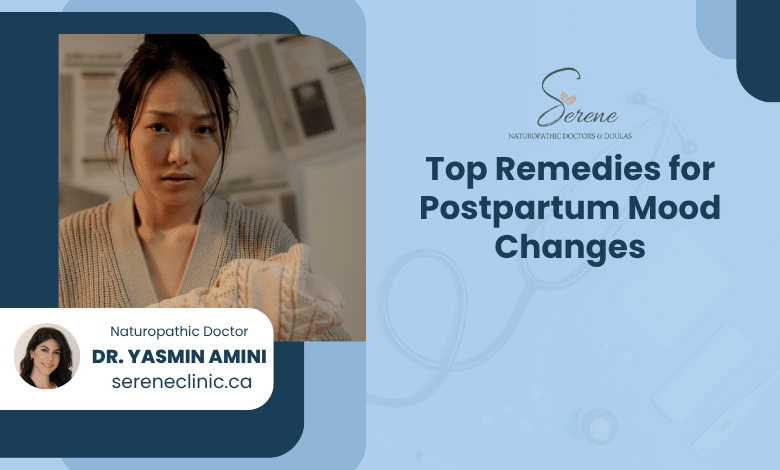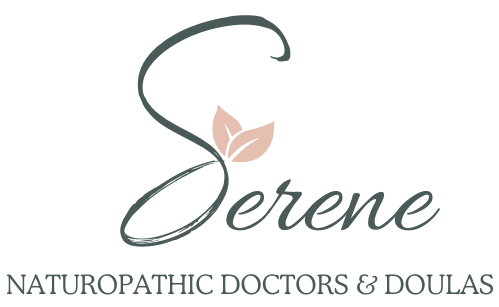
Discover natural, evidence-based support for postpartum mood shifts with a Naturopath doula in Toronto. Learn how Serene Clinic’s licensed Naturopathic doulas in our Doula clinic can help you find emotional balance after birth.
Introduction
Adjusting to life with a newborn can be joyful—but it can also bring unexpected emotional ups and downs. Postpartum mood changes, ranging from “baby blues” to more significant mood disorders, affect many new parents. At Serene Clinic, our holistic, medicine-informed strategy includes the steady support of a Toronto doula, natural therapies from a Naturopathic doula, and ongoing resources via our Doula clinic. This in-depth Q&A guide offers understanding and relief—body and mind—through evidence-informed remedies tailored for the postpartum period.
1. What are postpartum mood changes?
Postpartum mood changes fall into three main categories:
-
Baby Blues: Mild sadness, tearfulness, irritability—often beginning 2–3 days after delivery and resolving by 2 weeks.
-
Postpartum Depression (PPD): Symptoms lasting longer, with deep sadness, anxiety, feelings of worthlessness, or detachment.
-
Postpartum Anxiety or OCD: Excess worry focused on baby safety, routines, or intrusive thoughts.
Identifying which experience you’re having is key to getting the right support.
2. When should I seek help?
Reach out for support if you experience:
-
Persistent low mood beyond two weeks
-
Inability to bond with your baby
-
Overwhelming worry or panic
-
Suicidal thoughts—get help immediately (call emergency services)
Early intervention from mental health professionals or a Naturopath doula can change your recovery experience.
3. How can a naturopathic doula support emotional balance?
A Naturopathic doula brings a two-pronged approach:
-
Clinical expertise: Nutrient assessment, botanical medicine, and hormone balancing
-
Emotional presence: Gentle coaching, nervous-system regulation, and ongoing validation
This dual care—clinical and compassionate—is tailored to your unique path to wellness.
4. What supplements and herbs help with postpartum mood?
With your doula’s guidance, safe and effective botanicals may include:
-
Rhodiola & Ashwagandha: Adaptogenic support for stress resilience
-
St. John’s Wort: Mild-moderate depression support (monitor interactions)
-
Chamomile & Lemon balm: Anxiety and sleep support
-
L-theanine: Promotes calm focus
-
Omega‑3 fatty acids: Supports mood and brain health
Each supplement is selected based on lab insight, feeding status, and your overall health.
5. How does nutrition support postpartum mood?
A nourishing diet eases emotional wellness by:
-
Stabilizing blood sugar with whole grains, protein, and fiber
-
Including anti-inflammatory foods like berries, leafy greens, and wild salmon
-
Avoiding added sugars that can trigger mood dips
-
Incorporating fermented foods for gut-brain balance
Your Toronto doula will help you craft realistic, easy meal plans suited to life with a newborn.
6. What lifestyle practices ease mood changes?
Self-care becomes essential:
-
Sleep hygiene—adapted to newborn schedules
-
Gentle movement—walks, yoga, pelvic floor exercises
-
Breathwork & mindfulness—daily 5-minute grounding exercises
-
Creative outlets—journaling, meditation, or expressive art
Your Doula clinic provides tools customizable to your preferences and time.
7. How does emotional support work in a doula-led model?
-
Emotional check-ins during visits
-
Safe spaces to process birth-related stress or grief
-
Techniques like somatic release, guided compassion meditations
-
Support partner communication and family involvement
-
Timely referrals for mental health therapy, if needed
Empathy and validation go hand-in-hand with clinical remedies for true healing.
8. Can postpartum mood shifts be related to hormonal imbalance?
Absolutely. The dramatic drop in estrogen and progesterone following birth can significantly impact mood stability. When combined with sleep deprivation and nutrient depletion, it creates a perfect storm for emotional fluctuation.
A Naturopathic Doctor can help regulate hormones with:
-
Vitex (chasteberry) to stabilize progesterone levels
-
Maca root to support adrenal function and libido
-
Seed cycling for gentle hormone rebalancing
-
Lab testing to monitor cortisol, thyroid, and reproductive hormones
This functional medicine approach is what sets Naturopath Toronto care apart from standard postpartum support.
9. What role does the nervous system play in mood recovery?
Chronic stress keeps the nervous system in a heightened state—interfering with sleep, digestion, and emotional processing. Naturopathic doula care integrates:
-
Nervine herbs: like skullcap and passionflower
-
Vagus nerve stimulation: through breathwork and cold exposure
-
Trauma-informed care: recognizing stored tension from birth or previous experiences
-
Therapeutic touch: including craniosacral or acupuncture therapy
Calming the nervous system is foundational to feeling emotionally safe and resilient again.
10. What kind of postpartum visits can I expect from a naturopathic doula?
Here’s a typical care plan from our Doula clinic in Toronto:
| Week | Focus | Sample Services Offered |
|---|---|---|
| 1 | Recovery & bonding | Herbal sitz baths, lactation support |
| 2 | Emotional check-in & hormone support | Mood assessment, adaptogen therapy |
| 4 | Nutrition & energy restoration | Supplement review, meal planning |
| 6 | Reconnection & movement | Pelvic rehab, breath guidance, stress support |
11. How do Naturopathic doulas support breastfeeding challenges?
Breastfeeding and mood are deeply linked. If feeding is difficult or painful, emotional distress rises. A Naturopath doula addresses:
-
Latch and milk supply issues
-
Blocked ducts or mastitis through acupuncture and compresses
-
Galactagogue herbs like fenugreek or blessed thistle
-
Emotional overwhelm and guilt with gentle, non-judgmental support
We also teach your support partner how to help with bottle prep, massage, or post-feeding rest.
12. What are some common myths about postpartum mood support?
Here are a few misconceptions—and the facts that bust them:
-
Myth: “If I’m struggling, it means I’m a bad parent.”
Truth: Postpartum mental health struggles are medical and treatable. -
Myth: “I just need more sleep.”
Truth: While sleep helps, biochemical and hormonal changes require targeted care. -
Myth: “Natural therapies aren’t strong enough.”
Truth: When prescribed professionally, they’re both powerful and safe.
13. Can partners benefit from doula care too?
Absolutely! We include partners in:
-
Prenatal classes on emotional awareness
-
Teaching hands-on support methods for labor and postpartum
-
Shared rituals for sleep, bonding, and recovery
-
Managing partner fatigue and adjusting to new roles
The Toronto doula care model at Serene Clinic embraces family healing—not just birthing parent care.
14. How long does postpartum mood recovery take?
Recovery isn’t linear. On average:
-
Baby blues resolve in 10–14 days
-
PPD/PPA may need 6–12 months of active support
-
With naturopathic care, many clients report noticeable improvements by week 3 or 4
At our Doula clinic, we’re committed to long-term healing, not quick fixes.
Client Story: “From Overwhelmed to Empowered”
After a difficult birth and hospital discharge, Sarah felt lost. “I cried every night and questioned everything,” she said. “My Naturopathic doula at Serene helped me name my feelings without shame.”
With weekly acupuncture, magnesium supplementation, and daily check-ins, Sarah’s energy and hope returned. By week 6, she was confidently tandem feeding twins and sleeping 5 hours straight.
FAQs: Postpartum Mood and Naturopathic Support
Q1. Do naturopathic treatments interfere with antidepressants?
No. A Naturopathic Doctor ensures all remedies are safe and complement your current prescriptions.
Q2. Are services covered by insurance?
Yes! Our Naturopath doula visits often qualify under extended health plans.
Q3. Is postpartum depression the same as baby blues?
No. Baby blues are common and short-lived. PPD requires targeted support.
Q4. How soon after birth can I book a visit?
As early as day 1. We recommend booking at least 1 prenatal visit in advance.
Q5. Can I get help even if I didn’t give birth at Serene?
Absolutely. All birthing experiences are welcome at our Toronto doula center.
Q6. Can I combine naturopathic doula care with midwifery or OB-GYN services?
Yes! We work collaboratively with your medical team for integrative, whole-person care.
Conclusion: You Deserve More Than Just Survival
At Serene Clinic, we believe the fourth trimester deserves just as much reverence and care as birth itself. By working with a licensed Naturopathic doula, you’re not just recovering—you’re being restored, emotionally and physically, with natural tools and a compassionate hand.
Let us help you thrive. Because motherhood should be empowering—not isolating.
Serene Clinic Naturopathic Medicine Book Your Free Consultation Today
Connect with a Naturopathic Doctor and Doula near you, whether you are in Toronto or anywhere in Ontario.
Serene Clinic Naturopathic Doctors Book your complimentary meet and greet with an Ontario licensed Naturopathic Doctor and Doula:
https://sereneclinic.janeapp.com
This article is for informational and educational purposes only and is not intended as a substitute for medical advice, diagnosis, or treatment. Always seek the advice of your physician or other qualified health care provider with any questions you may have regarding a medical condition.
Frequently Asked Questions
No. A Naturopathic Doctor ensures all remedies are safe and complement your current prescriptions.
Yes! Our Naturopath doula visits often qualify under extended health plans.
No. Baby blues are common and short-lived. PPD requires targeted support.
As early as day 1. We recommend booking at least 1 prenatal visit in advance.
Absolutely. All birthing experiences are welcome at our Toronto doula center.
Yes! We work collaboratively with your medical team for integrative, whole-person care.





